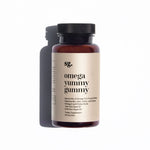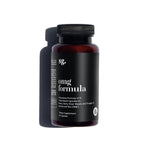What is "drive" anyway? And why should care?

What is "drive" really?
When we’re talking about women's wellness, there are so many things to discuss. One of the indicators of healthy hormone function is a healthy drive.
We hear this word A LOT! L-I-B-I-D-O, what does it really mean? Simply speaking, it's your "drive." But there is a lot more to it than that. In the simplest of terms: a high "drive" means you have higher desire. A lower "drive" means you have a lower desire. But let's unpack this shall we?
So, what causes a higher or lower libido?
Your libido might fluctuate depending on your level of stress or anxiety, how tired you are, the medication you are taking (including birth control), hormonal changes that come with age, various medical conditions, pregnancy, postpartum, your period, traumatic experiences related to sex, or intimacy issues. There are a whole host of factors involved. It's incredubly complex. There are so many factors that can contribute to a sex drive.
But, why is this even important?
Sex helps with stress relief in a really big way. And we all need that. It also helps boost your immune system. Those are just two examples. You might think sex isn't that important in your day to day life, but it actually impacts your health in more ways than you think. It's not just about having a healthy relationship with your partner. To be honest, that is the least of our concerns. What we care about is your female health first and foremost. Now that we have that out of the way, let's keep going.
So, what does a healthy sex drive look like?
There’s no one-size-fits-all answer to this question—we all have differing needs, so one woman’s sexual life may not be your cup of tea. That’s okay. There is no right answer here. Don't compare yourself to others to get to the right answer. Instead, ask yourself a few questions:
- Am I satisfied with my level of desire for sex?
- Am I satisfied with the quality of sex I have?
- Has there been a sudden change with my desire for sex?
These questions can help you determine whether your libido is on track, or if there is something you want to change. And be honest with yourself.
What can you do to improve your libido?
If your libido is lower than what feels comfortable and healthy for you, consider:
- Speak to your doctor. There’s no shame in consulting your doctor. They can help you determine what is causing decreased libido and offer solutions.
- Consult a sex therapist or counselor. Libido is as tied to your mental state and emotions as it is linked to your physical health. Discussing your experiences, needs, and challenges with an expert can make a world of a difference.
- Exercise more. Not only will regular exercise help you perform better, but it will also increase your stamina, improve your self-confidence, and lift your mood—all things that boost libido.
- Increase the amount of sleep you get. More (and better-quality) sleep helps you feel more energized and less stressed. Studies have shown direct links between getting more sleep and a higher desire for sex, with one study showing that an extra hour of sleep in women led to a 14% increase in the likelihood of having sex the next day.
- Try natural supplements and nutrients that increase your sex drive. Just like health supplements can improve your brain function or help you get clearer skin, sexual health supplements can provide the boost you need. We may be biased here, but our collection of hormonal health supplements help increase libido, mood, and a whole host of other things!
- In certain cases, try hormone therapy. After consulting with your doctor, the right course of action for you might involve hormone therapy, which means taking estrogen (or testosterone)—both of which play important roles in women’s sexual function—to increase your libido.








